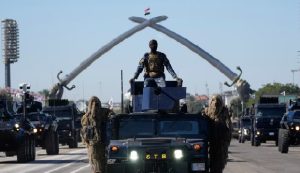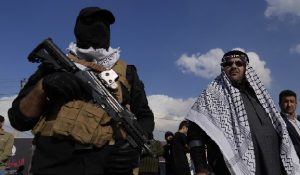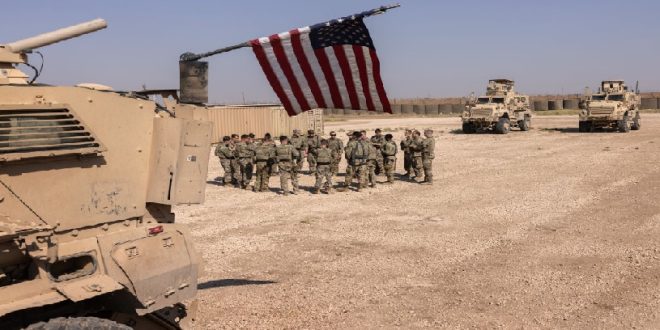19-02-2024
BAGHDAD: A visit by the commander of Iran’s elite Quds Force to Baghdad has led to a pause in attacks on US troops by Iran-aligned groups in Iraq, multiple Iranian and Iraqi sources told media, saying it was a sign Tehran wants to prevent a broader conflict.
 Esmail Qaani met representatives of several of the armed groups in Baghdad airport on Jan. 29, less than 48 hours after Washington blamed the groups for the killing of three US soldiers at the Tower 22 outpost in Jordan, the sources said.
Esmail Qaani met representatives of several of the armed groups in Baghdad airport on Jan. 29, less than 48 hours after Washington blamed the groups for the killing of three US soldiers at the Tower 22 outpost in Jordan, the sources said.
Qaani, whose predecessor was killed by a US drone near the same airport four years ago, told the factions that drawing American blood risked a heavy US response, 10 of the sources said.
He said the militias should lie low, to avoid US strikes on their senior commanders, destruction of key infrastructure or even a direct retaliation against Iran, the sources said.
While one faction did not initially agree to Qaani’s request, most others did. The next day, elite Iran-backed group Kataib Hezbollah announced it was suspending attacks.
Since Feb. 4 there have been no attacks on US forces in Iraq and Syria, compared to more than 20 in the two weeks before Qaani’s visit, part of a surge in violence from the groups in opposition to Israel’s war in Gaza.
“Without Qaani’s direct intervention it would have been impossible to convince Kataib Hezbollah to halt its military operations to deescalate the tension”, a senior commander in one of the Iran-aligned Iraqi armed groups said.
 Qaani and the Quds Force, the arm of Iran’s Revolutionary Guards that works with allied armed groups from Lebanon to Yemen, did not immediately reply to requests for comment for this story. Kataib Hezbollah and one other group could not be reached for comment. The US White House and Pentagon also did not immediately respond.
Qaani and the Quds Force, the arm of Iran’s Revolutionary Guards that works with allied armed groups from Lebanon to Yemen, did not immediately reply to requests for comment for this story. Kataib Hezbollah and one other group could not be reached for comment. The US White House and Pentagon also did not immediately respond.
Qaani’s visit has been mentioned in Iraqi media but the details of his message and the impact on reducing attacks have not been previously reported.
For this account, Reuters talked to three Iranian officials, a senior Iraqi security official, three Iraqi Shi’ite politicians, four sources in Iran-backed Iraqi armed groups and four Iraq-focused diplomats.
The apparent success of the visit highlights the influence Iran wields with Iraqi armed groups, who alternate between building pressure and cooling tensions to further their goal of pushing US forces out of Iraq.
The government in Baghdad, a rare ally of both Tehran and Washington, is trying to prevent the country again becoming a battlefield for foreign powers and asked Iran to help rein in the groups after the Jordan attack, five of the sources said.
Prime Minister Mohammed Shia al-Sudani “has worked with all relevant parties both inside and outside Iraq, warning them,” that escalation “will destabilize Iraq and the region,” Sudani’s foreign affairs advisor Farhad Alaadin told media when asked to confirm Qaani’s visit and the request for help to rein in armed groups.
The attack “played into the hand of the Iraqi government.” a Shi’ite politician from the ruling coalition said. Following the subsequent lull in hostilities, on Feb. 6 talks resumed with the United States about ending the US presence in Iraq. (Int’l News Desk)
 Pressmediaofindia
Pressmediaofindia




